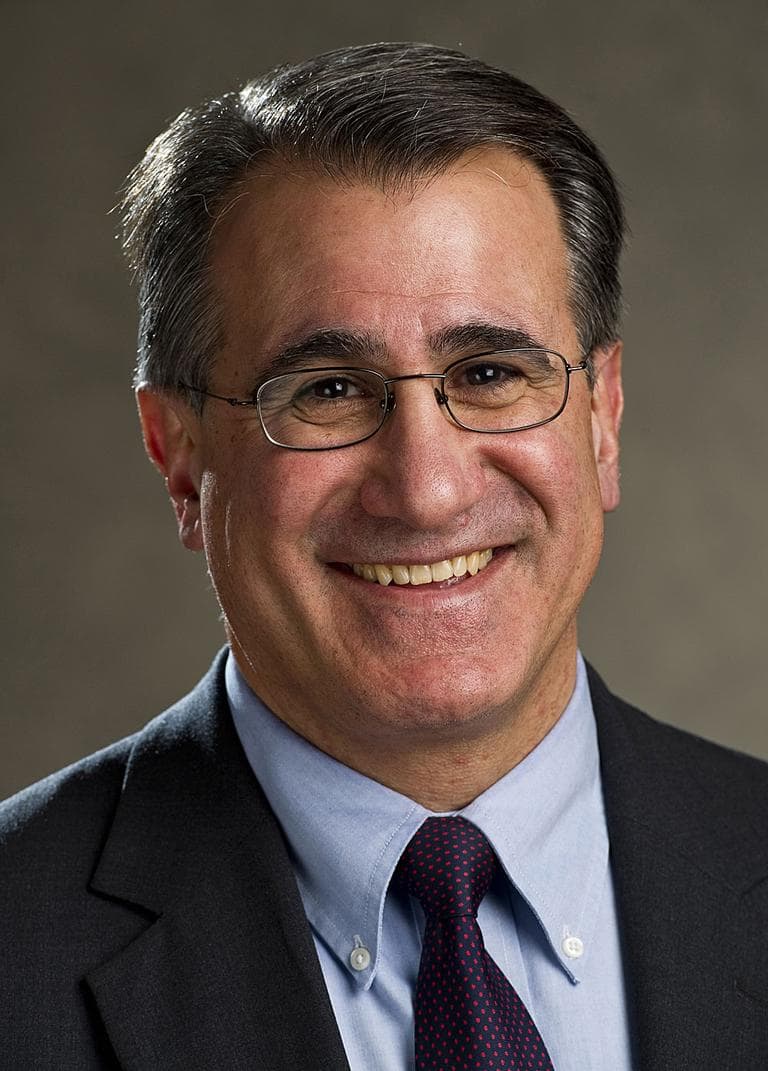Advertisement
Tufts President Anthony Monaco On Life, Learning And The Cost Of Higher Education
Resume
Some observers of higher education have said that Tufts University went out on a limb when it chose Dr. Anthony Monaco to serve as the university's newest president. Monaco doesn't have the typical track record of a university administrator. He is a scientist — a brilliant one — who's made pioneering discoveries in human genetics. He's also spent many years in England as a researcher and vice chancellor at Oxford University — as evidenced by a statue of Jumbo, the Tufts elephant, that's on his desk, which is wrapped in the colors of the British flag.
But perhaps it is this global and scientific background that drives Monaco's impressive new vision for Tufts. He wants to push the already-highly ranked university into an interdisciplinary powerhouse that tackles world problems via projects that cross campuses, departments and majors.
And that interdisciplinary approach? It's a recurring pattern in Monaco's own life, as I discovered when I recently visited his office. He and I spent some time talking about his life before Tufts, but it's his response to a question that's on everybody's mind right now that I wanted to share here. That question: Why does college cost so much?
Here's what Monaco had to say:
Well higher education is very costly to run because it's not like making a car, where you can try to be more efficient at it by an assembly-line process. It's a personal service provider in a sense that you're not trying to become more efficient by packing more students into the classroom. So I think we have to first realize that on the macroeconomic view it's a sector, which like dentistry or medicine, is traditionally going to be above the rate of inflation in its cost increases because of the way it's delivering. It also requires a lot of investments in facilities and business systems to run all the programs, and we need highly trained individuals, not only on the faculty, but also in the administration to do that.
At the same time we just finished a conditions survey of all of our buildings on all three campuses to show we have a backlog of deferred maintenance that we can't let go, otherwise future generations will be paying twice over for this. So we have to think about investing money into our buildings to make sure that they're not falling apart. We have to invest money in our systems, otherwise they will break down and we won't have a university that functions. These are all costly and I think those are some of the main reasons why you see the cost of higher education as high as it is today.
You also have to look at: there's universities, then there's universities. Tufts is a very selective university and I think the value of the education here is worthy of our students and the employment prospects they will have. One of my other concerns about the indebtedness of students is it will push them into careers that may not be the best thing for society, to have so many people in those careers and the reason they may do that may be is because of their concerns of paying off loans. We need more individuals involved in community engagement, public service, teachers. I'm not saying people in finance aren't good for society. I just worry ... about large percentages of our graduates going to that sector regardless of what they were studying at university.
Monaco is the first university president I've spoken to who's said this, that he's worried about the long-term societal effects of debt-loaded students seeking out high-paying banking jobs. And the data exist to justify Monaco's concern. A recent Harvard Magazine study found that among Harvard's Class of 2011, 41 percent planned to get a job in financial services, consulting or sales and marketing, regardless of what they studied in college.
It's a trend that Monaco says is also true of Tufts' professional schools. As he told me:
I have some concerns that the indebtedness of medical students is pushing people to sub-specialties rather than general practice and non-lucrative parts of medicine, like pediatrics, where we need lots of good quality doctors. ... Most people that go into science don't do it for the money.
Although Monaco is quick to add that particularly in Massachusetts, with our large science and biotech sectors, there are great employment opportunities. But this thing about doing science for the sheer love of it. ... Monaco is speaking from experience, and the heart. Because that's exactly what he did, as one of the first members of his family to go to college.
Guest:
- Anthony Monaco, president, Tufts University.
This program aired on February 9, 2012.